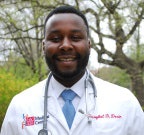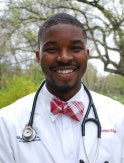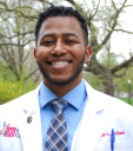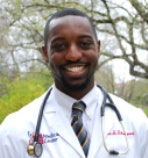Several years ago, three young Black men from Newark, N.J., made a pact to beat the streets of Newark and become doctors. These men blazed trails and held up an example to other young Black men across the country that let others know that they didn’t have to be defined by the limitations of their environments.
Many years later, four newly-minted young doctors are upholding that legacy.
 Maykel Desir
Maykel DesirMaykel Desir, Chigozirim Ekeke, Justin McGee and Loic Tchokouani met at the Todd A. Bell National Resource Center on the African American male on the campus of The Ohio State University, and they made a vow to support, nurture and see each other through the grueling work of obtaining their medical degrees.
Desir, who is the oldest child of Haitian-born parents, said the group of brothers with whom he traversed through medical school comprised “the most important circle to my success,” he said.
But Desir said the support the young men provided did not stop with the acquisition of the medical degree. “That success transcends medicine. It was great to have guys around me that helped me grow academically, spiritually, and as a man. Those guys are my brothers for life.”
Tchokouani agrees. “My White Coat brethren were constant shoulders of strength I could lean on, the iron that sharpened me daily, and minds that could think outside of the box to correct negative things on campus,” he said.
Parisian-born and Maryland raised and one of eight children, Tchokouani gained three additional brothers in Desir, Ekeke and McGee. “We expected nothing but excellence from each other and tolerated no missteps or nonsense. We pushed each other to be better and kept each one accountable for his actions, goals, and aspirations. These men are people I could be completely vulnerable with in every area of life (romantic relationships, family matters, financial decisions, which politics to play).”
 Chigozirim Ekeke
Chigozirim EkekeThe gravity of what it means to be Black and male—and, for three of the young men, first-generation Americans—and achieve on the levels they achieved is not lost on the White Coat brothers.
“I am black and male, and there are times when assumptions are made regarding those two aspects of my identity. I try to maintain a strong sense of self and remember the fundamental lessons my parents taught me about not allow others to define who I am and who I can be,” McGee said.
Tchokouani said it is not just the personal experiences that highlight their Blackness and Maleness, but professional stigmas even more highlight these two factors of the brothers’ identity.
“Maleness and Blackness are interesting concepts in medicine,” said Tchokouani. “When one looks at the percentages of black males in ANY specialty, … there is definitely a mighty shortage of black males in medicine.”
 Justin McGee
Justin McGee“Maleness is still something smiled upon in medicine …but, for some reason, when combined with blackness, there [is a sharp decline],” he added.
Ekeke, who was born in Atlanta, Ga., to Nigerian parents, said it is important to grow the number of Black men in medicine to help combat professional biases against the population.
“African-Americans, particularly black males, are an ‘at-risk’ group because of the many threatening medical conditions based on our social environment, genetics and professional biases that impact patient care,” he said. “As a black male physician, I have the privilege to address these issues to my colleagues and my patients in order to minimize the negative impact of professional bias in health care and research.”
McGee said that, to recruit more Black males to the field, “It is critical to start early and cultivate interest beginning in elementary school. Longitudinal exposure and mentorship is also important, as the path to the field of medicine is extended, tedious, and at times trying. Having strong support networks both inside and out of the field of medicine can be very helpful as well.”
 Loic Tchokouani
Loic TchokouaniAs for himself, McGee said he hopes to be able to address some issues of access and quality of care. “I want to be a clinically excellent physician, but overall I want to change the way we deliver care to patients,” he said. “Access is a persistent problem and I want to explore and cultivate novel ways to address this, either through pursuing administrative possibilities or doing some work in the private sector outside of the hospital engaging with different delivery models.”
“We increase the number of black males by showcasing examples of black men that have made it in medicine and allow these black men that have made it to pass on the blueprint,” said Tchokouani. “It is important for the aspiring black male physicians to know the logistics, what it takes to get into medical school, and also how to survive once you have gained medical school admission.”
For these brothers, the peer mentorship, the accountability, the friendship they formed were key to that survival through medical school.
“Medical school was a very challenging, humbling, and valuable experience. It was everything I expected and more. A person once told me that undergrad is like drinking out of a water fountain and medical school is like trying to drink out of a fire hydrant. I never heard truer words,” said Desir.















